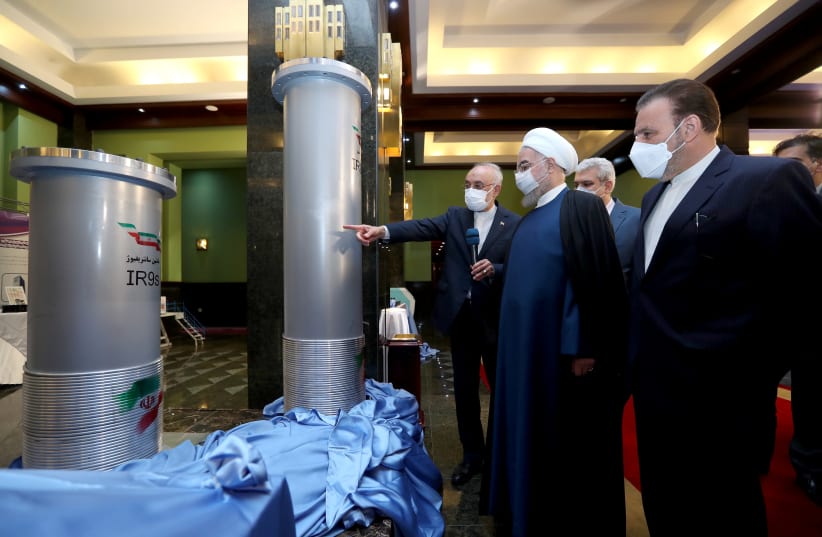American and Russian officials remained unsure if and when Iran will be willing to renew discussions on a return to the nuclear deal, known as the Joint Comprehensive Plan of Action, ahead of the sixth anniversary of its original signing on Wednesday.
Asked when nuclear talks will resume, Russian Ambassador to International Organizations in Vienna Mikhail Ulyanov told the daily newspaper Kommersant, in an interview the embassy translated into English on Monday: “As of today, no one, including Iranians, has an answer to that.”
The agreement restricted Iran’s uranium enrichment and gradually lifted US sanctions on Iran, expiring in 2030 and allowing the Islamic Republic to get close to breaking out to a nuclear weapon. The Trump administration left the JCPOA in 2018, opting instead for heavy sanctions to pressure Iran, and the Biden administration began indirect negotiations with Tehran in Vienna earlier this year to return to the deal.
The sixth round of indirect US-Iran talks ended in early June, before the Iranian presidential election. Ebrahim Raisi, a judge responsible for thousands of executions and sanctioned by the US for human rights violations, won that election.
Ulyanov said the delay in talks is “understandable,” in light of the election in Iran.
“There’s a new team coming to the office – they need time to figure this out. The question is really critical for both Iranian society and the establishment. It’s been a subject of a heated debate, so it’s not surprising,” the ambassador and Russia’s lead negotiator on the JCPOA said.
However, Ulyanov said there is “a certain irritation” among the other parties to the deal – likely referring to the US, UK, France and Germany – and “leaving new agreements hanging for such a long time does no good for the cause. We presume that the sooner the talks resume, the better. I think they won’t start earlier than in ten days, maybe later.”
Ulyanov said that, in his view, 90% of the negotiations to return to the JCPOA have been completed, but the remaining 10% “contain a number of politically sensitive issues that can hold the process back,” such as the US being unwilling to commit to future presidents not leaving the deal.
STATE DEPARTMENT spokesman Ned Price said in a press briefing on Monday that the question of whether Iran would return to negotiations “can only be addressed by Tehran,” and that US Special Envoy for Iran Robert Malley is “prepared to return to Vienna for a seventh round of talks as soon as they are scheduled.”
The US continues to believe that “diplomacy is the most effective means at our disposal to achieve… verifiably and permanently ensuring that Iran can never acquire a nuclear weapon,” he said.
Price said, however, that “we’re not imposing a deadline on these talks, but [US Secretary of State Antony] Blinken has made the point – [and] I’ve made the point from here as well – that we are conscious that as time proceeds, Iran’s nuclear advances will have a bearing on our view of ultimately returning to the JCPOA.”
Last week, the spokesman said that the Vienna “process won’t be open indefinitely… and it will get to a point where Iran’s provocations; Iran’s nuclear steps; that breakout time; and the concern that we have associated with it will potentially cause us to reconsider… We’re going to continue to assess the implications of Iran’s steps.”
Referring to the report by the International Atomic Energy Agency that Iran is using uranium metal enriched up to 20%, in further violation of the JCPOA, Price said: “We continue to urge Iran to stop this brinkmanship, to return to Vienna prepared for real talks, and to be in a position to be prepared to finish the work that we have started in April – that has now taken place over six rounds.”
Ulyanov argued that Iran’s latest violations of the JCPOA are “the direct result of the maximum pressure campaign” by the US.
Russia has avoided harshly criticizing the Islamic Republic, Ulyanov said, because Moscow saw the violations as a reaction to the US sanctions. However, he said that “now it seems there are reasons for concern: Iran seems to be going too far.”
Price reiterated that the negotiations in Vienna would only be about returning to the original 2015 version of the JCPOA, despite “profound concerns… with Iran’s behavior in the region.” Those concerns would be more difficult to address if nuclear violations continue, he argued.
Ulyanov spoke out against the idea of a “JCPOA+” that would add further restrictions on Iran.
“If the task had been to restore the JCPOA and add some commitments on top of that, the negotiations wouldn’t have started at all,” he said. “However, in reality, we witness that everyone – except for us and the Chinese – is trying to add something or take something off.”
